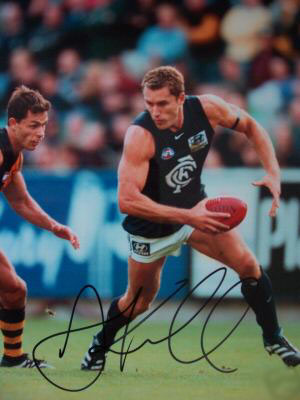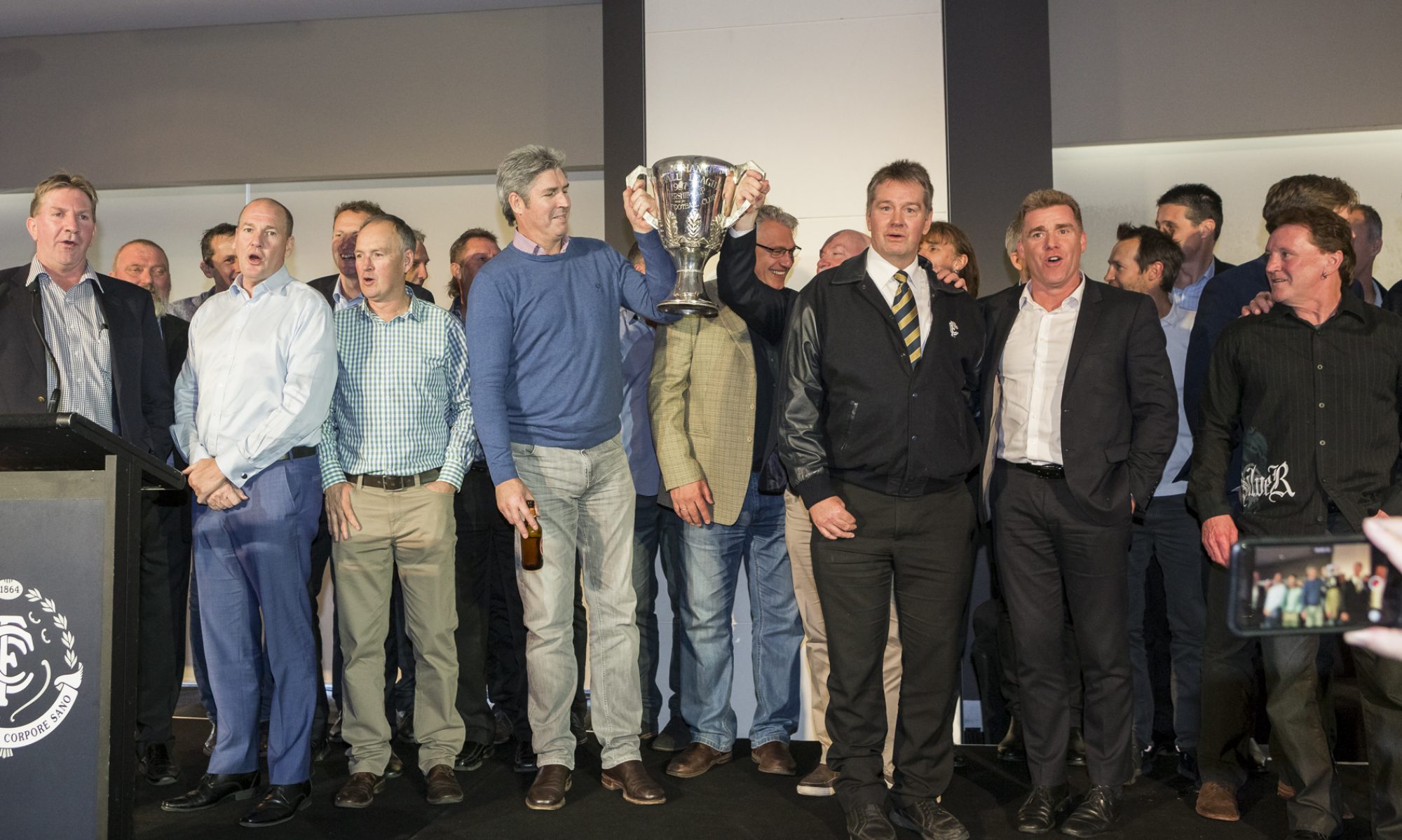A very happy 40th to Kouta!
————————
From the Blueseum:
Anthony Koutoufides

Career: 1992 – 2007
Debut : Round 13, 1992 vs Adelaide, aged 19 years, 147 days
Carlton Player No. 985
Games : 278
Goals : 226
Last Game : Round 17, 2007 vs St Kilda, aged 34 years, 191 days
Guernsey No. 43
Height : 190 cm (6 ft. 2 in.)
Weight : 95 kg (15 stone, 0 lbs.)
DOB : 18 January, 1973
Premiership Player: 1995
Leigh Matthews Trophy (AFLPA MVP) : 2000
Best and Fairest: 2001, 2005
All Australian: 1995, 2000
Leading Goalkicker : 1997
Club Captain: 2004 – 2006
Throughout the history of VFL/AFL football, few individual players have actually changed the game. However, such was the impact of Anthony Koutoufides – “Kouta” to the masses of Blues supporters he thrilled during his celebrated 15-season career at Princes Park between 1992 and 2007 – that today he is recognised as the prototype of the 21st century footballer.
A 191 cm powerhouse with pace, endurance and sensational all-round skills, Koutoufides starred in Carlton’s 1995 Premiership victory over Geelong, won two club Best and Fairest awards, and was twice selected as an All Australian. In 1997 he was Carlton’s leading goal-kicker, and in 2000, was voted the AFL Players Association’s Most Valuable Player. Late in his career, amid his club’s darkest hours, he stepped up to the captain the Blues for three seasons, before retiring one year later as one of the most respected and admired men ever to have played the game.
Kouta’s heritage spanned four cultures. His father; Dimitrios (‘Jim’ to his friends and family) was born in Egypt to Greek-Cypriot parents, while his mother Anna came from northern Italy and met her future husband while on holiday down under. As part of the vast post-World War II migration from Europe to Australia, the couple settled in Melbourne’s northern suburbs at Lalor, and Anna produced three sons. The two eldest, Paul and Anthony, became keen schoolboy track athletes from their early teens, while they also embraced the Australian code of football. Before long therefore, a choice had to be made.
Anthony was an outstanding junior prospect who represented his state in three disciplines; the 100/110 metre hurdles, high jump and decathlon. From the age of 15 he was being talked about as a potential Olympian, although he and Paul were also enjoying success on the football field with Lalor Juniors. The crunch came in 1989, when the brothers were approached by Carlton scout Wayne Gilbert with an invitation join the Blues’ Under-19 squad. Despite the fact that both were keen Collingwood fans at the time, there was no hesitation. Paul and Anthony couldn’t wait to get to Princes Park.
Paul went on to play a couple of seasons of Under-19 football and one Reserves match for Carlton, without progressing to senior level. Anthony followed the same pathway, but from his earliest games his mature physique, outstanding agility and appetite for the contest marked him as something special. At first he was seen as a key defender, especially when he moved up to Reserve grade in 1992 to take on the full-back role, and won the Carlton Reserves Best and Fairest. Considering that he also made his senior debut the same year and played six first-grade matches, it was an outstanding achievement.
Having played through the lower grades in guernsey number 46, Anthony requested a change to his favourite number 43 when he was promoted to Carlton’s senior squad, and made an eye-catching debut against the Adelaide Crows at Princes Park in round 13, 1992. Sitting on the interchange bench until just before half-time, he ran onto the field and became involved in the play straight away with a clever shepherd that allowed Ron De Iulio an easy goal. Shortly afterwards, he kicked a smart goal himself from deep in a pocket with the second kick of his career, after his first attempt had been smothered. The Blues won by 23 points, and Anthony’s career was up and away.
Later in the year, in round 23 against Collingwood at VFL Park, Waverley, spectators got a glimpse of the future when Koutoufides shrugged off an opponent, swooped on the ball and picked it up with one hand. A gob-smacked Carlton coach David Parkin later said to him; “I’ve been waiting twenty years to see what you just did.” A few weeks later, Anthony finished off an impressive first season by collecting 19 possessions, four marks and his first Brownlow Medal vote as Carlton lost to West Coast at Subiaco in the last round of the year. He carried the ball in one hand that day too, and it rapidly became his trademark.
Koutoufides’ second season in 1993 started full of promise, only to be derailed by the first in a long series of injuries. After playing the first five games in defence, he damaged ankle ligaments in round 6 against Collingwood, and spent 10 weeks on the sidelines. Back to match fitness late in the year as the Blues tuned up for the finals, he was running into form again on the eve of the Grand Final against Essendon, but on selection night was overlooked in favour of Mark Athorn. Two days later, Anthony could only watch in despair as Essendon’s ‘Baby Bombers’ demolished Carlton by 44 points to win the flag.
Carlton’s fan base began to really embrace Koutoufides in 1994, especially when coach Parkin decided to play him on a wing and see if the opposition had anyone with the size and speed to match him. Invariably, they didn’t, and by mid-year the first cries of “Kout-ta, Kou-ta!” were echoing from the stands. Against Richmond at Princes Park in round 23, he provided a constant avenue to goal for the Blues, picking up 27 effective possessions as the home side destroyed the Tigers by 113 points. A few weeks later, his blossoming career reached a new level when he experienced his first two senior finals. Carlton lost both however, going down in successive weeks to Melbourne and Geelong.
Anthony’s fourth season in 1995 was simply sensational. In 25 games he kicked 22 goals, and collected 25 possessions (or more) on six occasions. He took more marks, earned more Brownlow Medal votes (12) than any other Blue, and was selected as an All Australian, before he almost single-handedly demolished Geelong in the Grand Final. Playing on a wing, but ranging far and wide through the midfield, Kouta racked up 31 possessions and eight telling marks on that unforgettable afternoon, as a remorseless Carlton ground the Cats into the dust and claimed the Blues’ 16th Premiership. Among a host of Navy Blue stars, Greg Williams was awarded the Norm Smith Medal as best on ground – but Koutoufides too, would have been worthy winner.
Kouta’s form in 1996 mirrored that of his team – occasional lapses, indispersed with regular successes. He didn’t miss a match all season, and kicked 24 goals while averaging 21 effective disposals and six marks per game. He produced an absolutely stunning performance against the West Coast Eagles in round 5 at Subiaco, hauling down 18 big marks (amid 35 possessions) as Carlton won a thriller by one point. At the end of the home and away season, he finished equal with Fraser Brown as the club’s top vote-catcher in the Brownlow Medal with 12 votes, before being one of his team’s best in a disappointing final series that saw the Blues eliminated by straight-sets losses to West Coast and Brisbane.
In 1997, after four consecutive finals campaigns, Carlton crashed to eleventh place on the ladder. Kouta played his 100th game in round 15 against Melbourne, as a raft of stars including long-serving captain Stephen Kernahan,Greg Williams, Justin Madden, Earl Spalding and Mil Hanna all reached the end of their careers. While the next generation of leaders – including Koutoufides – continued their progress, coach Parkin sometimes asked his star mid-fielder to play up forward, and Anthony generally delivered.
Playing on a wing against Collingwood at the MCG in round 4, 1997, Kouta racked up 32 possessions in a solid win. Later in the year, during the return game in round 19, Parkin sent him to full-forward, where he took a couple of screamers and kicked 6.4 from 22 possessions and 7 marks. Carlton came out on top again by 16 points, and that big haul helped him reach a total of 28 goals for the season. It was a modest return, but good enough to win him Carlton’s Leading Goalkicker Award, ahead of Justin Murphy (26 goals) and Stephen Silvagni (25).
Under a new captain in Craig Bradley, the Blues aimed for real improvement in 1998 – until the awful news broke that Jim Koutoufides had been diagnosed with lung cancer at the age of just 58. His death in March devastated his close-knit family, and by association, everyone involved at the Carlton Football Club. A stricken Anthony still played 21 games for the year, although he and the team as a whole were never really in finals contention, and once again finished eleventh.
Eventually, with the support of his many friends, colleagues and team-mates, Kouta returned to something near his brilliant best in 1999, averaging 20 possessions and 6 marks per game to finish runner-up to Matthew Allan as Carlton’s Best and Fairest. Standout games included 27 possessions and 7 marks against St Kilda in round 6; 25 disposals and 12 marks against Brisbane in round 11, and 23 possessions and 10 marks against Hawthorn in round 14. But those numbers were all but forgotten after the Blues qualified for the finals in sixth place, and fought their way through to a Preliminary Final showdown against minor premiers and hot flag favourites Essendon. The Bombers were gunning for their 16th flag to equal Carlton’s record, and the Blues had set themselves to stop them. What transpired that day produced one of the greatest finals matches of all time.
In front of 80,000 at the MCG, an under-manned, bloody-minded Carlton simply refused to be beaten. Trailing by 11 points at three-quarter time, the Blues kicked 6.2 to Essendon’s 4.2 in a frantic last quarter, to win by a point – largely due to 30 minutes of football from Koutoufides that was described by a stunned Stephen Kernahan as “the greatest quarter of football ever played.” Running hard to all parts of the field, Kouta had ten kicks, four clearances, three defensive rebounds, six marks and kicked two great goals in an epic quarter that brought a truly famous victory. Such was the euphoria around Princes Park in the days after that sensational game, that the following Saturday’s Grand Final loss to North Melbourne was almost an anti-climax. Sure, Carlton hadn’t won another flag – but neither had Essendon!
Kouta played his 150th game in round 2, 2000 in a 42-point win over Hawthorn at Princes Park, and was enjoying another prolific season when he picked up a career-best total of 39 disposals, 13 marks, 4 hit-outs and 2 goals in Carlton’s big win over Sydney in round 8. Demonstrably at the peak of his form, he was a clear favourite for the Brownlow Medal, before the Blues hosted North Melbourne at Princes Park in round 11. When that game began, Kouta was stunned to be manned up in the midfield by the Kangaroos’ champion centre half-forward and captain Wayne Carey.
It was a match-up for every football lover to savour, but Koutoufides rose to the challenge and turned it into a non-event. Leading the Roo captain a merry dance, Kouta kept Carey under a tight wrap and won the football himself 38 times – earning 17 kicks, 21 handpasses, 8 marks and kicking five terrific goals in a vital win that cemented a top-two ladder position the Blues. Kouta later conceded that this was in fact, his best-ever individual effort. “When people ask me which was the best game I ever played,” he said some time afterward, ”It would have to be the one against North Melbourne.”
By round 20, 2000, Carlton was comfortably sitting second on the ladder when disaster struck in the form of a posterior cruciate ligament strain to Kouta’s left knee. The surgery required ended his season, but he had been so good during the previous five months that he was still named as an All Australian, as well as the AFL Players Association Most Valuable Player (now known as the Leigh Matthews Trophy). Carlton responded by offering him an unprecedented 5-year contract (rumoured to be worth one million dollars) which was quickly accepted. From then on, Kouta would be a Blue for life.

